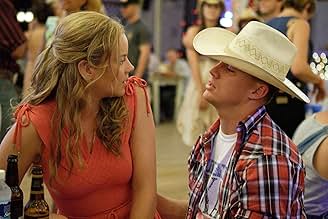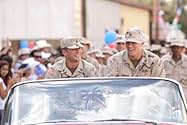A veteran soldier returns from his completed tour of duty in Iraq, only to find his life turned upside down when he is arbitrarily ordered to return to field duty by the Army.A veteran soldier returns from his completed tour of duty in Iraq, only to find his life turned upside down when he is arbitrarily ordered to return to field duty by the Army.A veteran soldier returns from his completed tour of duty in Iraq, only to find his life turned upside down when he is arbitrarily ordered to return to field duty by the Army.
- Director
- Writers
- Stars
- Awards
- 2 wins & 5 nominations total
Connett Brewer
- Curtis
- (as Connett M. Brewer)
- Director
- Writers
- All cast & crew
- Production, box office & more at IMDbPro
Featured reviews
Director Kimberly Peirce ("Boys Don't Cry") brings another powerfully charged film of such raw emotion that upon later reflection of the movie I felt like I had witnessed real events.
Stop-Loss follows the fictional story of a soldier, Brandon King (Ryan Philippe), who has returned home after a tour in Iraq. His contract is up and he just about to get out when he is stop-lossed (a "fine-print" section in all soldiers' contracts that gives the President the power to extended soldier's contracts in time of war). He refuses to be shipped back to Iraq, and goes AWOL in search of his state's senator for help. What follows is his road trip to fight the stop-loss as well as showing the devastating affects his fellow soldiers (Channing Tatum, Joseph Gordon-Levitt) experience from the horrible war. Its' acting, directing, and writing had such a feeling of authenticity, and combined with the fact that 81,000 of our brave soldiers have already been stop-lossed since Spetember 11,2001, this film feels like a true story.
One thing that made this film succeed so well was it's director was a woman, and she was able to make a movie were you could feel and see the emotions these guys were feeling even as they would desperately try and mask them.
The acting was extraordinary from the three main soldiers, most notably Ryan Philippe who is so gritty and real in his performance that he seems like he actually is a marine. Channing Tatum gives a genuine performance, but Joseph Gordon-Levitt's is the most haunting of the trio as a soldier who fights his Post Traumatic Stress Disorder with excessive amounts of booze and slowly slips into a deep hole of despair.
This films is not a propaganda piece, it simply portrays something that is going on right now. It brings up many good points, but never bashes you with a certain viewpoint but leaves it to you to decide. This is such emotionally powerful, deeply moving film, the best film I have seen since the year started, and destined to be one of my favorites from this year.
Stop-Loss follows the fictional story of a soldier, Brandon King (Ryan Philippe), who has returned home after a tour in Iraq. His contract is up and he just about to get out when he is stop-lossed (a "fine-print" section in all soldiers' contracts that gives the President the power to extended soldier's contracts in time of war). He refuses to be shipped back to Iraq, and goes AWOL in search of his state's senator for help. What follows is his road trip to fight the stop-loss as well as showing the devastating affects his fellow soldiers (Channing Tatum, Joseph Gordon-Levitt) experience from the horrible war. Its' acting, directing, and writing had such a feeling of authenticity, and combined with the fact that 81,000 of our brave soldiers have already been stop-lossed since Spetember 11,2001, this film feels like a true story.
One thing that made this film succeed so well was it's director was a woman, and she was able to make a movie were you could feel and see the emotions these guys were feeling even as they would desperately try and mask them.
The acting was extraordinary from the three main soldiers, most notably Ryan Philippe who is so gritty and real in his performance that he seems like he actually is a marine. Channing Tatum gives a genuine performance, but Joseph Gordon-Levitt's is the most haunting of the trio as a soldier who fights his Post Traumatic Stress Disorder with excessive amounts of booze and slowly slips into a deep hole of despair.
This films is not a propaganda piece, it simply portrays something that is going on right now. It brings up many good points, but never bashes you with a certain viewpoint but leaves it to you to decide. This is such emotionally powerful, deeply moving film, the best film I have seen since the year started, and destined to be one of my favorites from this year.
Stop-Loss (2008)
**** (out of 4)
Hard hitting, Anti-Iraq film has Ryan Phillippe playing a U.S. soldier who leaves his final mission in Iraq but soon learns he's been stop-lossed, which means the government can break your original contract and send you back to Iraq. Phillippe refuses to go back so he goes AWOL and hits the road with his best friend's girl (Abbie Cornish) while trying to figure out what to do. Over the past few years there have been countless films protesting the Iraq war and all of them have been fair (Lions for Lambs) to really poor (Redacted) but this one here is clearly the best of the bunch but it's also one of the best war movies out there and clearly one of the best of 2008. The movie has a strong stance against the war but it's certainly Pro-Soldier and the film bleeds with love for the young men putting their lives on the line each day. The film opens with a scene in Iraq where the soldiers are working a checkpoint when a group of thugs show up with guns a soon a big battle breaks out and leads to tragedy. I really enjoyed what director Peirce did here by instead of focusing on the violence she clearly wants the viewer to see that these are kids doing this fighting. She makes it clear to us that it's kids doing the shooting and being shot at, which is something people and the media seems to forget. The Anti-Iraq stuff is handled very well and never becomes too preachy unlike many other recent films. I think the film's one problem is that it really should have ran at least an hour longer because the movie not only looks at Phillippe's situation but also two of his friends who are dealing with their own battles on returning home. The film is a lot like The Deer Hunter, a film that took three hours to tell its story, and I think that long running time would have worked well here. The two friends play a major part in the story and an emotional one so I think their stories could have been pushed out a bit further. The performances in the film are all rather remarkable and this is certainly the greatest work I've seen from Phillippe. I don't want to ruin anything but he has to go through all sorts of mental pain in the film and he pulls this off wonderfully well. I think Phillippe has always been a good actor but this film here pushes him to a great one. He really does give a strong, raw and highly emotional performance, which is the heart of the film. Cornish is also very good in her role as is Channing Tatum as the best friend. No matter where you stand on the actual war, that shouldn't keep you away from this film, which is quite original in how it tells its story and most importantly it does pay tribute to these kids who lost their lives on the battle field. This is a very strong and highly emotional film that pushes all the right buttons and really delivers.
**** (out of 4)
Hard hitting, Anti-Iraq film has Ryan Phillippe playing a U.S. soldier who leaves his final mission in Iraq but soon learns he's been stop-lossed, which means the government can break your original contract and send you back to Iraq. Phillippe refuses to go back so he goes AWOL and hits the road with his best friend's girl (Abbie Cornish) while trying to figure out what to do. Over the past few years there have been countless films protesting the Iraq war and all of them have been fair (Lions for Lambs) to really poor (Redacted) but this one here is clearly the best of the bunch but it's also one of the best war movies out there and clearly one of the best of 2008. The movie has a strong stance against the war but it's certainly Pro-Soldier and the film bleeds with love for the young men putting their lives on the line each day. The film opens with a scene in Iraq where the soldiers are working a checkpoint when a group of thugs show up with guns a soon a big battle breaks out and leads to tragedy. I really enjoyed what director Peirce did here by instead of focusing on the violence she clearly wants the viewer to see that these are kids doing this fighting. She makes it clear to us that it's kids doing the shooting and being shot at, which is something people and the media seems to forget. The Anti-Iraq stuff is handled very well and never becomes too preachy unlike many other recent films. I think the film's one problem is that it really should have ran at least an hour longer because the movie not only looks at Phillippe's situation but also two of his friends who are dealing with their own battles on returning home. The film is a lot like The Deer Hunter, a film that took three hours to tell its story, and I think that long running time would have worked well here. The two friends play a major part in the story and an emotional one so I think their stories could have been pushed out a bit further. The performances in the film are all rather remarkable and this is certainly the greatest work I've seen from Phillippe. I don't want to ruin anything but he has to go through all sorts of mental pain in the film and he pulls this off wonderfully well. I think Phillippe has always been a good actor but this film here pushes him to a great one. He really does give a strong, raw and highly emotional performance, which is the heart of the film. Cornish is also very good in her role as is Channing Tatum as the best friend. No matter where you stand on the actual war, that shouldn't keep you away from this film, which is quite original in how it tells its story and most importantly it does pay tribute to these kids who lost their lives on the battle field. This is a very strong and highly emotional film that pushes all the right buttons and really delivers.
Kimberly Peirce becomes one of the latest directors to try and only marginally succeed in making a compelling film about the Iraq conflict.
Peirce takes on as her subject the military's stop-loss clause, essentially a back door draft by which the military can use fine print in recruits' contracts to prevent them from getting out once their time is up. Peirce obviously feels strongly about the policy, but what should be a hard-hitting drama feels instead like a rather preachy after-school special. She coaxes a nice performance out of Ryan Phillipe, as the soldier who goes AWOL when his stop-loss clause is activated, but she doesn't fare as well with the rest of the cast. The film suffers from confusing editing, that doesn't always make it clear where characters are or how events are related to one another, and the writing at times is weak as well, with character motivations not coming across as clearly as they should.
I don't know what it is about the Iraq conflict that makes it so hard for filmmakers to make good movies about it. Maybe it will have to be over for a while before anyone can begin to approach it with any success.
Grade: B-
Peirce takes on as her subject the military's stop-loss clause, essentially a back door draft by which the military can use fine print in recruits' contracts to prevent them from getting out once their time is up. Peirce obviously feels strongly about the policy, but what should be a hard-hitting drama feels instead like a rather preachy after-school special. She coaxes a nice performance out of Ryan Phillipe, as the soldier who goes AWOL when his stop-loss clause is activated, but she doesn't fare as well with the rest of the cast. The film suffers from confusing editing, that doesn't always make it clear where characters are or how events are related to one another, and the writing at times is weak as well, with character motivations not coming across as clearly as they should.
I don't know what it is about the Iraq conflict that makes it so hard for filmmakers to make good movies about it. Maybe it will have to be over for a while before anyone can begin to approach it with any success.
Grade: B-
I really liked this movie. I wasn't looking for a bloody battle scene and there wasn't much of that expressed. Most of what was conveyed was the loss of friends in a situation that could happen to soldiers who march into harms way. Then the soldiers return home, back to the way things were? Their lives are not the same, and the people at home can't understand because they weren't there to see a friend die in their arms at the hands of some terrorist killers.
My brother just retired from the Army. He volunteered in Iraq for 1 year. He safely returned home, but his life had changed from that moment he was in Iraq. He said they lost a few young men, and another returned home severely burned from a cocktail thrown into the vehicle. At 130 degrees, how can they keep the windows closed in a military vehicle with the engine off. Two men that died were young (18 and 20). I feel the young soldiers have not received enough training and are too young to deal with the stress of war.
The movie had me thinking about the young men and women that barely have a year of training and next have RPGs hurling at them, roadside bombs, suicidal bombers walking into streets. How can anyone be trained to deal with that and be aware of it before it happens?
I commend the different positions on war in this movie: 1) Soldiers who are willing to die for their families and country. 2) Soldiers who have served their country and feel they should have the choice to step down from their jobs.
Stop-loss was something I never heard of until I saw the movie. How on earth can we say in the United States we have FREEDOM to choose if that privilege is removed when you enlist? It is like when you quit a job, move to another state, join a religion. FREEDOM to Choose! The Stop-Loss sanction nullifies the FREEDOM to step down after serving your country for 1 term or more. Do they think that will encourage people to sign up to serve in the armed forces if the contract removes their basic right of FREEDOM that we all hold so dearly. I was angry to hear soldiers are forced to return to serve multiple times. Many soldiers clearly need to stay home to recover and try to live a normal life instead of sending them back to die. It sounds as if these soldiers are no more than a body with a gun to send back into war.
I would recommend seeing this movie!
My brother just retired from the Army. He volunteered in Iraq for 1 year. He safely returned home, but his life had changed from that moment he was in Iraq. He said they lost a few young men, and another returned home severely burned from a cocktail thrown into the vehicle. At 130 degrees, how can they keep the windows closed in a military vehicle with the engine off. Two men that died were young (18 and 20). I feel the young soldiers have not received enough training and are too young to deal with the stress of war.
The movie had me thinking about the young men and women that barely have a year of training and next have RPGs hurling at them, roadside bombs, suicidal bombers walking into streets. How can anyone be trained to deal with that and be aware of it before it happens?
I commend the different positions on war in this movie: 1) Soldiers who are willing to die for their families and country. 2) Soldiers who have served their country and feel they should have the choice to step down from their jobs.
Stop-loss was something I never heard of until I saw the movie. How on earth can we say in the United States we have FREEDOM to choose if that privilege is removed when you enlist? It is like when you quit a job, move to another state, join a religion. FREEDOM to Choose! The Stop-Loss sanction nullifies the FREEDOM to step down after serving your country for 1 term or more. Do they think that will encourage people to sign up to serve in the armed forces if the contract removes their basic right of FREEDOM that we all hold so dearly. I was angry to hear soldiers are forced to return to serve multiple times. Many soldiers clearly need to stay home to recover and try to live a normal life instead of sending them back to die. It sounds as if these soldiers are no more than a body with a gun to send back into war.
I would recommend seeing this movie!
Maybe the idea was to show the total hopelessness of the conflict--that it was not really a war but urban warfare, and that there is no way to win or to have a happy ending. But that's just an idea--it's not a movie.
I thought that the set-up was fine. But I am not sure the filmmakers knew where to go with it. Their take on the stop-loss policy is obvious, and it is a message that should be heard. But I think the film would have been more interesting if any character exhibited any real growth during the film. The vets were all depicted as basket cases--the most well-adjusted vet seemed to be the double-amputee--he told us why he would want to go back to Iraq and there was at least some productive purpose that would have been served by his return there.
Perhaps there are soldiers who don't mind being stop-lossed--who truly believe they are accomplishing something positive over there. It would have been refreshing to have a character like that--a non-basket case. It would have been good to hear arguments supporting the stop-loss program (if there are any).
The last 20-30 minutes of this film were baffling. The end of the film (not an ending, just an end) was very unsatisfying.
Ryan Philippe did a competent job, but rarely conveyed anything not apparent from the lines or situation. For example, you could see that a lot of his post-war angst was attributable to guilt. How that tied in with the ending is just a mystery to me.
I recall that a very similar military policy was explored by Joseph Heller in Catch-22. I think a comparison to that novel and film is more apt than comparing this to The Deer Hunter.
I wish this film could have been much better than it was.
I thought that the set-up was fine. But I am not sure the filmmakers knew where to go with it. Their take on the stop-loss policy is obvious, and it is a message that should be heard. But I think the film would have been more interesting if any character exhibited any real growth during the film. The vets were all depicted as basket cases--the most well-adjusted vet seemed to be the double-amputee--he told us why he would want to go back to Iraq and there was at least some productive purpose that would have been served by his return there.
Perhaps there are soldiers who don't mind being stop-lossed--who truly believe they are accomplishing something positive over there. It would have been refreshing to have a character like that--a non-basket case. It would have been good to hear arguments supporting the stop-loss program (if there are any).
The last 20-30 minutes of this film were baffling. The end of the film (not an ending, just an end) was very unsatisfying.
Ryan Philippe did a competent job, but rarely conveyed anything not apparent from the lines or situation. For example, you could see that a lot of his post-war angst was attributable to guilt. How that tied in with the ending is just a mystery to me.
I recall that a very similar military policy was explored by Joseph Heller in Catch-22. I think a comparison to that novel and film is more apt than comparing this to The Deer Hunter.
I wish this film could have been much better than it was.
Did you know
- TriviaThe title refers to a provision in all military service contracts that says a service member can be involuntarily extended beyond their discharge (from active duty) date, and at times beyond their final discharge from service date, according to the needs of the service.
- GoofsWhen Sgt. King visits Rico, as he pushes his wheel chair out of the sun you can clearly see a bulge in Rico's t-shirt where his real arm is resting.
- Quotes
[from trailer]
Passport Issuer: Here's your new ID. If you go, you're gone for good.
- ConnectionsFeatured in Siskel & Ebert: 21/Chapter 27/Flawless/Stop-Loss/Run Fatboy Run (2008)
- SoundtracksCourtesy of the Red, White and Blue (The Angry American)
Written by Toby Keith
Details
Box office
- Budget
- $25,000,000 (estimated)
- Gross US & Canada
- $10,915,744
- Opening weekend US & Canada
- $4,555,117
- Mar 30, 2008
- Gross worldwide
- $11,212,953
- Runtime1 hour 52 minutes
- Color
- Sound mix
- Aspect ratio
- 1.85 : 1
Contribute to this page
Suggest an edit or add missing content


























